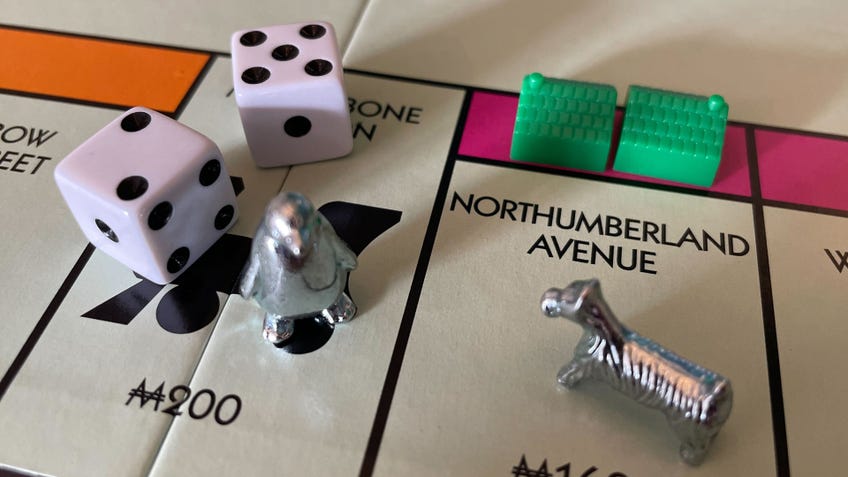
Ditch the house variants and avoid arguments with our recap of the classic board game's official rules.

Rules complexity: Very low
Strategic depth: Very low
Monopoly is probably the most famous board game of all time, with a copy in every game cupboard and countless families set to bust out a timeworn copy over the Christmas holidays. So, surely, everyone knows how to play Monopoly by now?
In fact, Monopoly’s popularity over the decades means that the classic board game has given rise to endless house rules and variants, many of which have been assumed to be the proper way to play by players who’ve grown up with them.
Not only do these house rules make Monopoly less fair - which is saying a lot for a game where most of the outcome already comes down to what you roll - they also make the notoriously long board game even slower to finish, dragging out its length across multiple hours and testing the patience of even the most stalwart of fans.
To see this content please enable targeting cookies. Manage cookie settingsLuckily, we’re on hand to set the record straight, by teaching you how to play Monopoly correctly - or, at least, the way it was designed to be played - and answering common Monopoly rules questions.
So ditch that Free Parking rule, keep those Get Out of Jail Free cards at the ready and avoid spending an hour arguing over whether you get double money for landing on Go, as we teach you how to play Monopoly using its official rules.
Two to eight players can play Monopoly (the exact number may vary depending on your edition). Monopoly takes between 20 minutes and three or more hours to play, depending on the number of players and what you roll.
In Monopoly, players are competing to bankrupt their opponents by purchasing property and building houses and hotels to charge the most rent when their rivals land on the spaces.
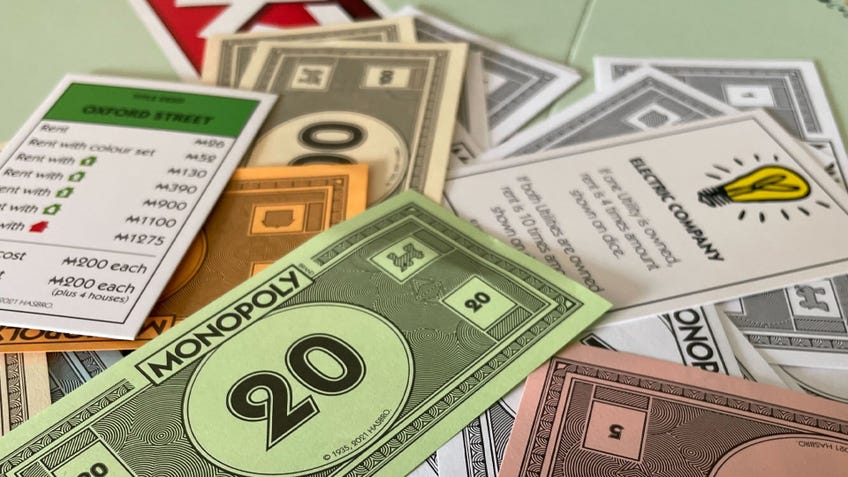
The exact contents of your Monopoly box will depend on its edition, but these are the standard contents of the most recent Classic Monopoly:
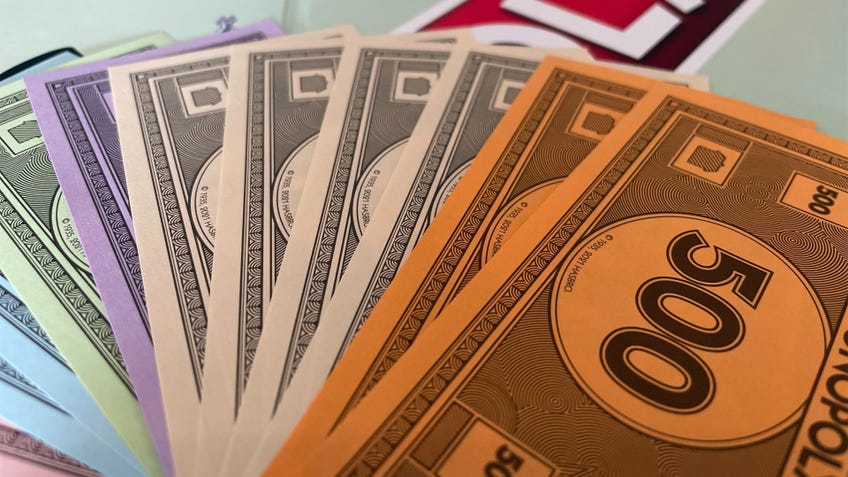
Each player starts Monopoly with $1,500 in money. The official Monopoly rules specify that players must start the game with a specific combination of banknotes.
Monopoly starting money:
If you are playing with a US edition of Monopoly released before September 2008, the number of notes for each denomination is different: give each player two $500 notes, just two $100 notes, two $50 notes, six $20 notes and five each of $10, $5 and $1.
On each player’s turn, they roll both dice before moving that number of spaces clockwise around the board. If you land on or pass Go during your move, you immediately collect $200 as directed by the Go space.
When the player has moved their full roll, they perform the action of the space they finished on - this is usually choosing whether to buy an available property, paying rent to the owner of a purchased property, drawing a Chance or Community Chest card, or following other instructions (such as Go to Jail or paying Luxury/Super Tax).
Once they've finished performing the action of their space, the player's turn ends - unless they rolled doubles, which means they can roll again and take another turn.
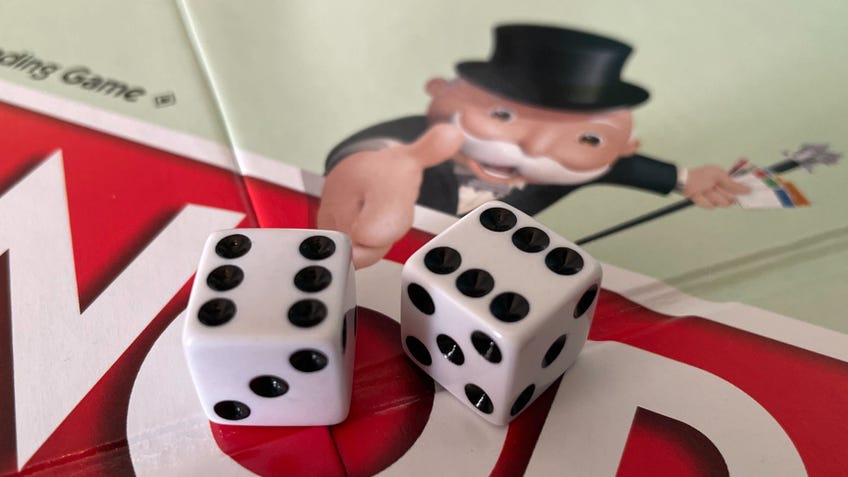
If you roll doubles in Monopoly, you get to roll again after you have completed your first turn. This means you effectively take two turns in a row, giving you the chance to buy multiple properties or draw multiple cards by landing on two separate spaces. If you roll doubles on your second roll, you get to roll again and take a third turn.
If you roll doubles three times in a row, you are “caught speeding”: instead of moving for the third roll, you must move your piece immediately to the Jail space and end your turn. To leave Jail on your next turn, you must just use a Get Out of Jail Free card, roll doubles or pay the $50 fine, as normal.
Like the Free Parking rule, landing on Go in Monopoly is another popular house rule. The official rule is that landing on Go in Monopoly doesn’t give you any extra money: you still get $200, as you do when you pass Go.
If you land on Go as directed by an Advance to Go Community Chest or Chance card, you also collect $200 as normal. This means if you pass Go, then land on a Community Chest/Chance space that tells you to Advance to Go on the same turn, you receive $400 in total: $200 for passing Go the first time, then another $200 for landing on it.
A popular house rule is that players may receive double the money - $400 in most versions - by landing on Go, but this makes Monopoly longer to finish, so it’s not recommended.
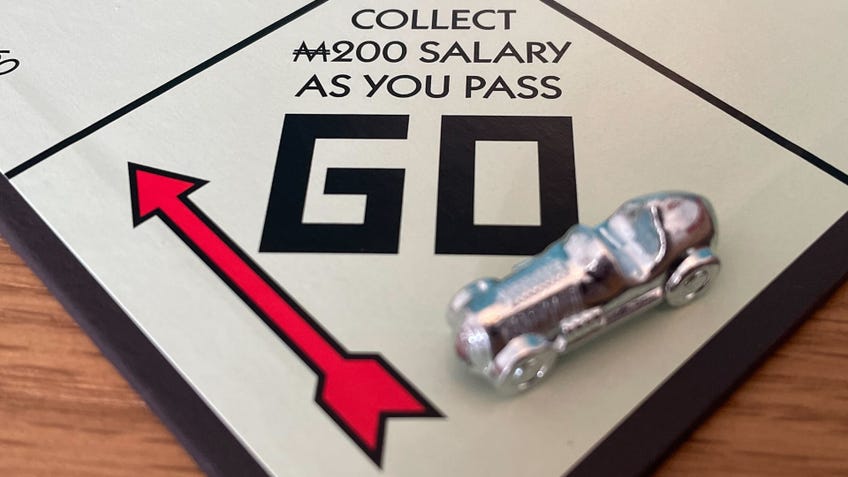
If you land on an available (ie. not currently owned by a player) property, you can choose to buy the property for the value printed on the card. If you decide to pass on buying the property, the property is auctioned between all of the players. A player who passes on buying a property at its printed cost can choose to bid on the same property. There is no set starting bid; whoever bids first sets the starting bid. Bidding continues until the highest bidder wins the card.
When you purchase a property, you pay its cost to the bank and take the matching title deed card. From then on, if another player lands on that property, they must pay rent to the owner equal to the property’s rent value. This can be increased by adding houses and hotels to a property. If a property is mortgaged (by flipping the title deed card over), rent is not collected until it is unmortgaged again.
If a player lands on a property you own and you do not ask for rent before the next player rolls their dice, you have missed your chance and cannot collect the rent. So make sure you pay attention!
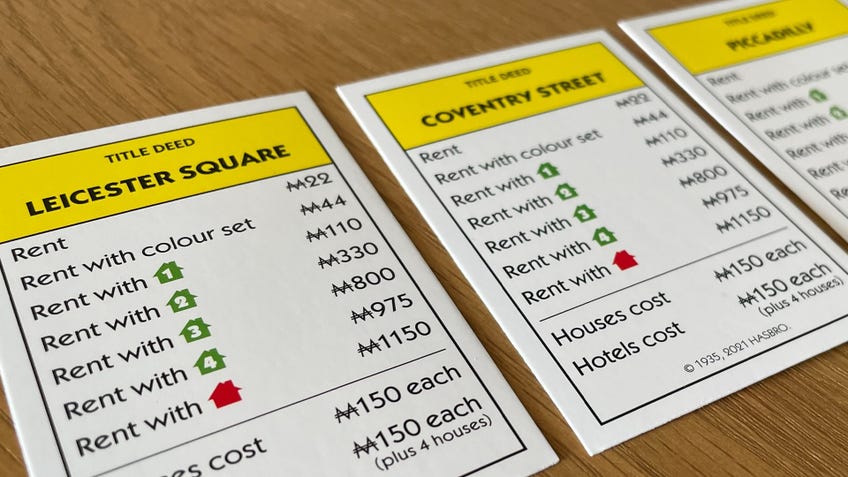
The official rules for Houses and Hotels in Monopoly state that you must own all of the properties of a single colour before you can begin construction.
By owning all of the properties in a colour group, any unimproved properties (without houses or hotels) may charge double rent to players that land on them. This applies even if one or more of the properties is mortgaged - unless it is the property landed on, in which case it won’t collect rent at all.
Each property may have up to four houses maximum. Houses must be built so that each property in a group has one house before a second house is built on any space of the same colour, every space has two houses before a third is built, and so on. In the same way, houses can be sold back to the bank for half their original cost, keeping the number of houses on each property within one. (eg. No fewer than two houses on a space if another currently has three, and so on.) The title deed card tells you how much each house increases that property’s rent by.
Once each property in a colour group has four houses, the player may build a hotel by replacing the four houses (returning them to the bank) on one space with a hotel. Only one hotel can be built on a property, but each property in a colour group may have a hotel. Hotels are the best way to maximise rent from a property.
Houses and hotels can be bought from the bank at any time - even during another player’s turn - and added to a property’s space on the board. (The exception is utilities and stations, which cannot have houses or hotels.) If the bank runs out of houses, the player must wait for a house to be available before building one.
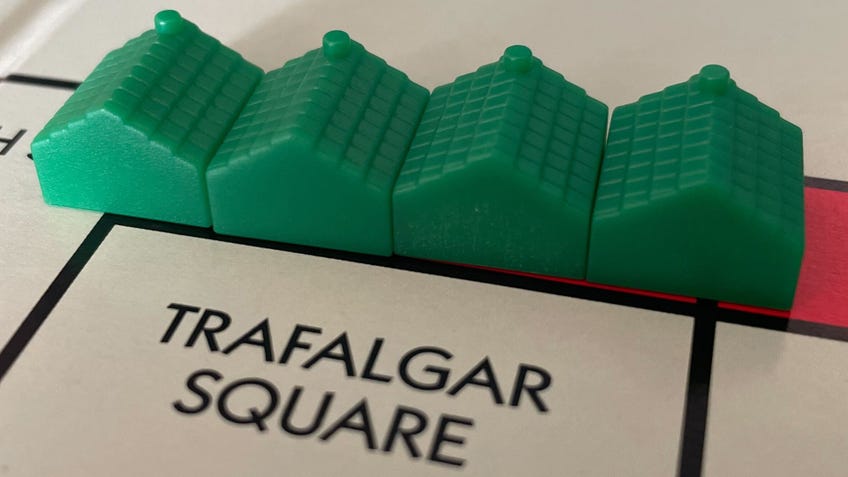
To mortgage a property they own, a player can flip over the title deed card to its ‘mortgaged’ side. The bank will then immediately pay them the mortgage value of the property. A player can choose to mortgage properties at any time in Monopoly - even when it’s not their turn.
Only properties without houses or hotels can be mortgaged; if you have any buildings on the space, you must sell them (following the rules above) before mortgaging.
If a property is mortgaged, the owner does not collect rent when another player lands on its space. However, if you own all of the properties in a colour group and a player lands on another unmortgaged property without buildings (houses or hotels), you may still charge double rent even if one of the properties in the group is mortgaged.
To unmortgage a property, the player must pay the mortgage cost plus 10% interest on the mortgage value. (In more recent editions of Monopoly, the total amount needed to unmortgage is written on the back of the card.)
Yes, you can buy mortgaged properties in Monopoly. Players can choose to trade mortgaged properties with other players for an agreed-upon value.
However, an important rule is that the player receiving the mortgage property must immediately pay 10% interest on the mortgage value to the bank. If they do not choose to unmortgage the property by paying the rest of the outstanding mortgage value, they will have to pay the mortgage value plus another 10% in interest on a future turn when unmortgaging.
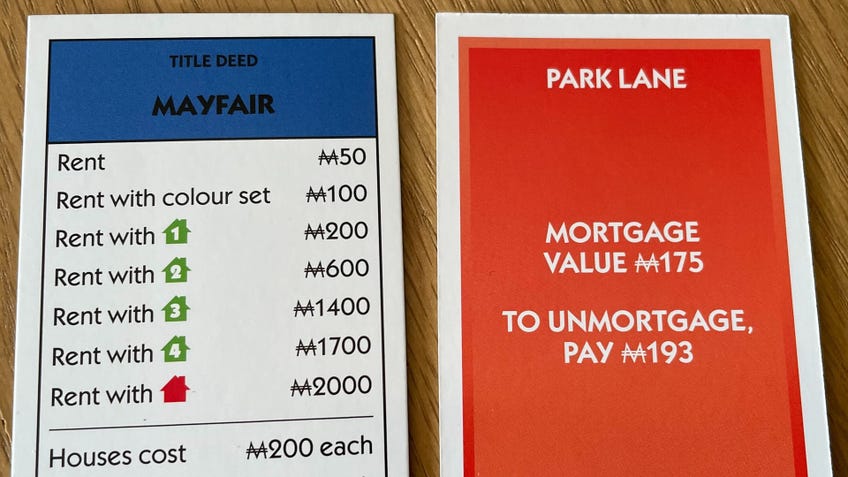
Players can choose to trade properties with other players at any time in Monopoly. Properties can be freely traded for money or other properties, a combination of both, or in place of rent - whatever the two players agree upon.
However, Monopoly’s official rules state that properties cannot be traded with houses and hotels on - they must be unimproved. In order to trade a property with another player, the current owner must sell any houses or hotels on the space back to the bank (following the rules above) before offering it in trade.
Players can be sent to Jail in Monopoly in three ways: rolling doubles three times in one turn, landing on the Go to Jail space or drawing a Go (Directly) to Jail card from a Community Chest or Chance space. When sent to Jail, you do not pass Go and do not collect $200, no matter where you are on the board. You place your player piece on the ‘In Jail’ section of the Jail space (rather than Just Visiting).
On their next turn, players can leave Jail in three ways: discarding a Get Out of Jail Free Card, paying a $50 fine or successfully rolling doubles.
If you use a Get Out of Jail Free Card or pay the fine, you move your piece to the ‘Just Visiting’ section of the space and immediately take your turn as normal by rolling the dice to move.
If you attempt to roll doubles to leave Jail, you lose their turn if you are not successful. After your third unsuccessful attempt to roll doubles, you must immediately use a Get Out of Free Card or pay the $50 fine, before moving the total of your third unsuccessful roll.
If you successfully roll doubles to leave Jail, you do not get another roll - you simply move the amount on the dice and activate whatever space you land on. However, if you use a Get Out of Jail Free card or pay the $50 fine to leave Jail, then roll doubles, you are able to roll again as with a normal turn.
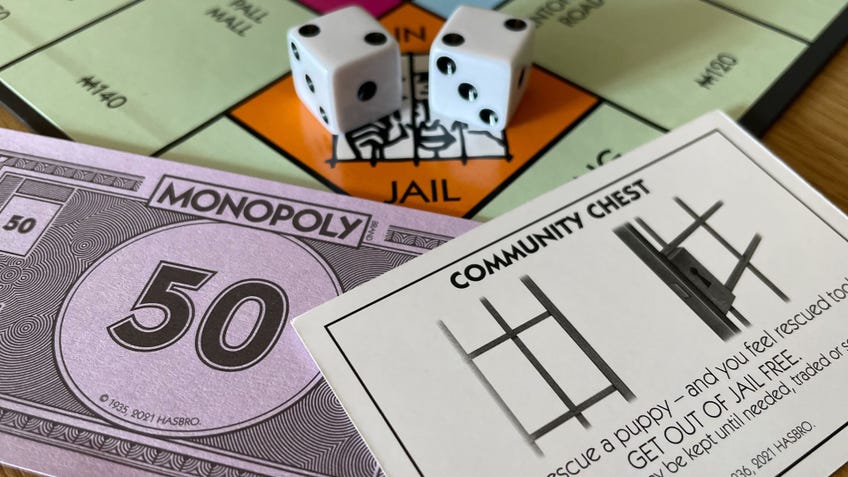
Yes, you can collect rent while in Jail in Monopoly. You can also still buy and sell properties and houses and hotels on properties you own.
In fact, sitting in Jail in the later turns of the game may be an effective strategy to collect rent without risking landing on others’ expensive properties - remember you can only stay there for three turns at most, though!
The official Monopoly Free Parking rule is that the space doesn't do anything. No money goes to the centre of the board, and you do not collect it if you land on the Free Parking space. You simply land on the space and wait there until your next turn.
However, many people play using the house rule that any money paid as fees or taxes (for example, from the Income Tax and Luxury/Super Tax spaces and certain Chance and Community Chest cards) goes to the middle of the board, and is collected by the person who lands on the Free Parking space. This is not an official rule, and actually makes playing Monopoly much longer - so it’s best to not use it!
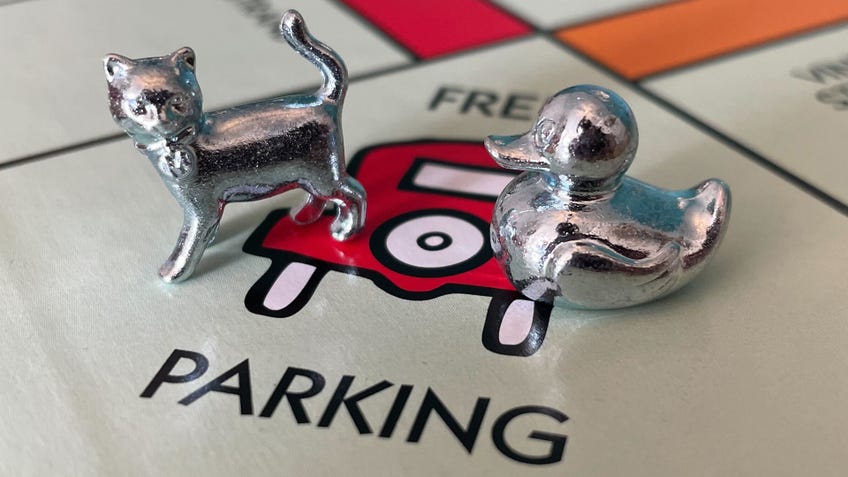
You win Monopoly by being the last player left with money. Players are eliminated by going bankrupt, which happens when they need to pay money to the bank or another player - through rent, tax or other fees - and do not have enough money to pay (or equivalent properties to trade in agreement with the other player, in the case of rent).
If a player is bankrupted by money that they owe another player, that player takes possession of the eliminated player’s remaining property cards. Houses and hotels are sold back to the bank for half of their cost, as with the normal rules for trading properties - the money is then given to the surviving player.
If the player takes possession of any mortgage properties, they must immediately pay 10% interest on the mortgage value. If they choose not to unmortgage the properties at the time by paying the remaining mortgage value, they will need to pay the mortgage value plus another 10% interest to unmortgage them on a future turn.
If a player is made bankrupt when failing to pay the bank, the bank takes possession of their remaining properties. All houses and hotels are removed from the properties. The properties are then auctioned off between the remaining players, as with a typical property auction.
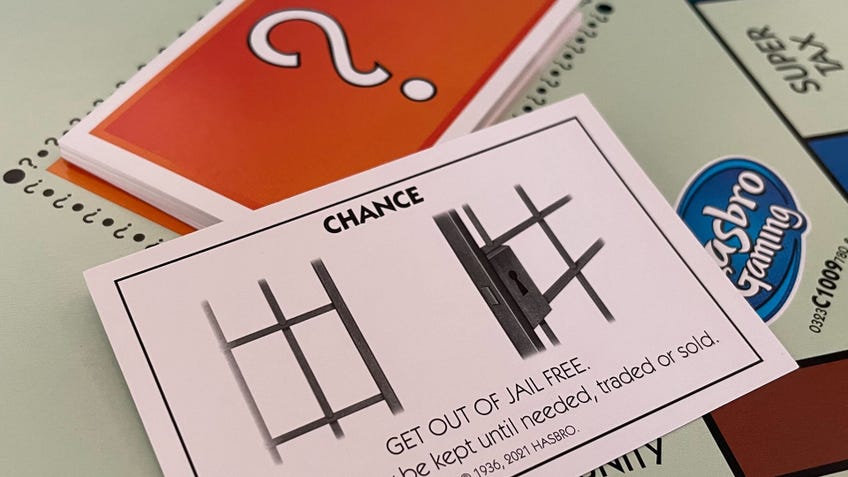
Looking for help with playing some of the other classic family board games? Check our guides for how to play Cluedo and how to play chess, or, for something a little different, our guide for playing Exploding Kittens.
Matt Jarvis: After starting his career writing about music, films and video games for various places, Matt spent many years as a technology, PC and video game journalist before writing about tabletop games as the editor of Tabletop Gaming magazine. He joined Dicebreaker as editor-in-chief in 2019, and has been trying to convince the rest of the team to play Diplomacy since.